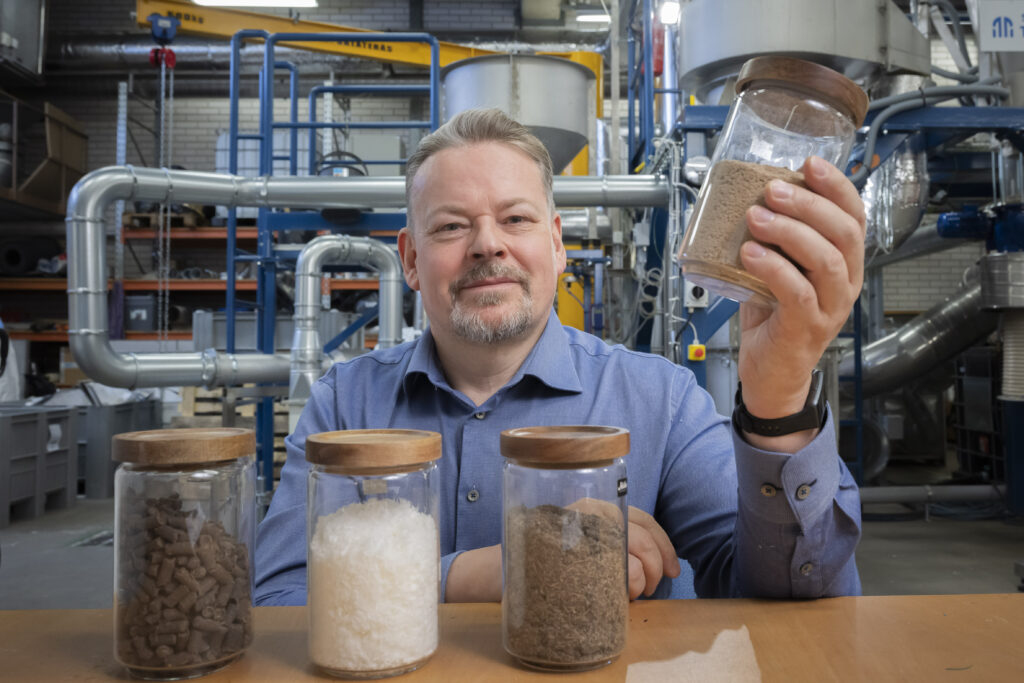Why do you think biomass is a key commodity within the larger energy transition?
Materials produced from bio-based raw materials play a central role in replacing products based on fossil raw materials. The cornerstone of a sustainable bioeconomy is to maximise the value of raw materials to derive the greatest possible benefit from limited resources.
Biomass is a key commodity in the larger energy transition due to its renewable nature and versatility. It can be converted into various forms of energy, reducing reliance on fossil fuels.
At TM Systems, we are particularly interested in bio-based residual waste. Industrial bio-based by-products can be used in bioenergy production, replacing ecologically unsustainable raw materials. Due to their large quantity and nutrient content, these biomass sources are also crucial for nutrient recycling.
However, many industries burn their wet-side stream for energy production with a very low economic feasibility. Wet biomass cannot be viably stored or transported, and burning it releases emissions that contradict carbon neutrality goals, also offering a poor heat value of as low as 3 MJ/kg.
We are participating in the Argus London Biomass event this year to showcase our latest innovation, SuperDryer™. SuperDryer addresses challenges by sustainably, energy efficiently, and cost-effectively drying diverse biomasses. Drying improves biomass storage, usability, transportability and energy content. SuperDryer delivers a high-quality endproduct with a high heat value of up to 18 MJ/kg.
How do you think biomass plays a role in your industry? Do you think it has more potential to grow?
Absolutely. According to a recent study published by the Energy Transitions Commission and European Forest Institute, there will be a demand for 70-150% more biomass for energy and as a raw material for various materials by 2050.
However, a significant imbalance already exists between the demand for biomass and sustainable supply, as production cannot keep pace with market needs. Expectations of future biomass usage surpass sustainable supply projections by 50-100%. That being said, material recycling is still in the early stages, and we don’t even know all the ways these once-discarded, now-valuable raw materials can be utilised.
For instance, we have successfully dried materials from waste sludge from industries such as pulp and paper, agrowaste, mechanical wood and so on. Also, the dried food industry side streams to valuable raw materials.
Do you think the current regulatory framework in Europe reflects the global industry?
We believe that global considerations are essential within the regulatory framework, and the existing frameworks in Europe support innovative practices within the global biomass industry.
Europe is setting an example for global industries, constantly tightening our directives and aspiring to be forerunners in increasing recycling rates for consumers, municipalities and companies.
What are some of the regions and sectors you think could become future biomass players?
I believe that sectors no longer have any limits. Beyond the traditional agriculture and pulp and paper industries, we observe customers from diverse sectors – including textiles, bioenergy, food production, cosmetics and pharmaceuticals– deriving significant benefits from biomasses. Several industries can convert various biomasses, such as pulp and side streams from the food industry, into new products.
Regionally, I see that besides its strong forest industries, Finland is actively increasing its biomass recycling rates in several industries. Additionally, southern Europe and southeast Asia stand out in biomass utilisation.
Why are conferences such as the Argus London Biomass event important? What do you aim to achieve from it?
We are thrilled to participate in this year’s event, as we are in the process of launching our new drying innovation. We look forward to connecting with professionals in the field. Conferences and exhibitions of this nature play a crucial role in encouraging collaboration, sharing practical insights, exchanging knowledge and networking among industry professionals, researchers and policymakers in the biomass sector.
We invite everyone to visit our booth at the conference to explore how we can transform biomasses into high-value commodities. Additionally, our experts will be giving presentations at the event, and we look forward to exchanging more details there.
